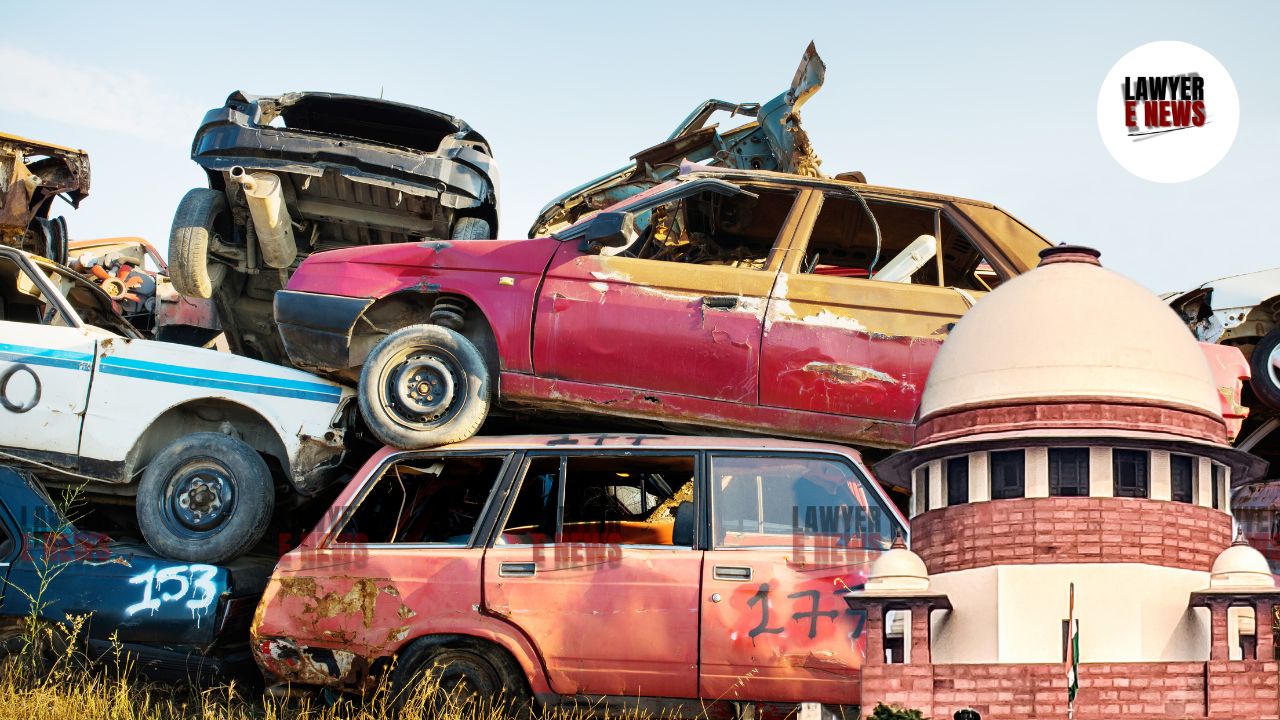-
by Admin
15 February 2026 5:35 AM



Guidelines Must Consider Individual Emissions, Not Just Vehicle Age: SC Permits Challenge to Delhi’s Vehicle Scrappage Policy - Supreme Court of India allowed Nagalakshmi Laxmi Narayanan, an applicant challenging the blanket ban on diesel vehicles older than 10 years and petrol vehicles older than 15 years, to present her grievances before the Delhi Government. The applicant argued that the policy, based on a 2015 National Green Tribunal (NGT) order, disproportionately impacted pre-existing vehicle owners and sought prospective application of the rules. A bench comprising Justices Abhay S. Oka and Augustine George Masih permitted her to withdraw the application, allowing her to file a representation with the concerned authorities.
The case arises from the long-standing MC Mehta v. Union of India proceedings concerning pollution control in Delhi NCR. The NGT’s 2015 order restricting the operation of older diesel and petrol vehicles in Delhi was subsequently supported by the Supreme Court, forming the basis of Delhi’s 2024 guidelines on scrapping older vehicles. The guidelines have been met with resistance from vehicle owners like Narayanan, who argue that they should not apply retrospectively, particularly where vehicle registration certificates remain valid.
The applicant, who owns a 2014 diesel Audi with a registration valid until 2029, contends that the mandate disregards the actual emissions and roadworthiness of individual vehicles. She asserts that her vehicle, compliant with emission norms and fit for use, is unjustly affected by the scrappage policy.
The primary legal contention is whether the guidelines implementing the NGT order should apply retrospectively, especially for vehicles purchased before the 2015 NGT ruling. Narayanan sought the Court’s intervention to prevent retroactive application of the ban and argued that this scrappage policy, implemented without compensation for valid registrations, leads to financial loss and limits vehicle use.
Senior Advocate Aparajitha Singh, amicus curiae in the MC Mehta case, noted that the Supreme Court has previously upheld the NGT directive underlying these guidelines. The bench, however, clarified that it could not address the retrospective or prospective application within the current proceedings:
“Unless you challenge that order… How can we disturb the direction issued by NGT? So long as the order of NGT is not modified, we can't do anything. This is not Article 226 jurisdiction. We are only monitoring orders passed in MC Mehta [case],” Justice Oka emphasized.
The Supreme Court agreed with Narayanan’s counsel’s request to withdraw the application, granting liberty to file a formal representation with the Delhi Government. The Court stated:
“We dispose of the application by granting liberty to the applicant to make representation which will be decided by appropriate authority in accordance with law.”
The Court added that the applicant would retain the right to legally challenge any adverse decision rendered by the authority.
The applicant raised several objections against the blanket scrappage policy, including:
Disproportionate Impact on Vehicle Owners: Owners of older but well-maintained vehicles, many purchased before the NGT order, face financial losses and a loss of use without compensation.
Arbitrary Criteria Based on Vehicle Age: The applicant argued that age alone is an arbitrary measure, failing to consider individual emissions, which may be minimal in well-maintained older vehicles.
Impact on Middle- and Lower-Income Groups: The policy, she contended, disproportionately affects those unable to afford early replacement of vehicles.
Lack of Clarity in Policy Scope: The NGT orders did not expressly address whether they should apply retrospectively or prospectively, creating legal uncertainty for affected vehicle owners.
The Supreme Court’s decision allows the applicant to raise concerns directly with the Delhi Government regarding the scrappage policy’s prospective or retrospective application. The applicant now has the opportunity to seek redress from the appropriate authority while retaining the right to challenge any unfavorable ruling. The matter highlights the broader implications of environmental policy on vehicle ownership rights and calls for a balanced approach that considers individual vehicle emissions and financial equity.
Date of Decision: October 25, 2024
Nagalakshmi Laxmi Narayanan v. Union of India in MC Mehta v. Union of India, IA in Writ Petition (C) No. 13029 of 1985
